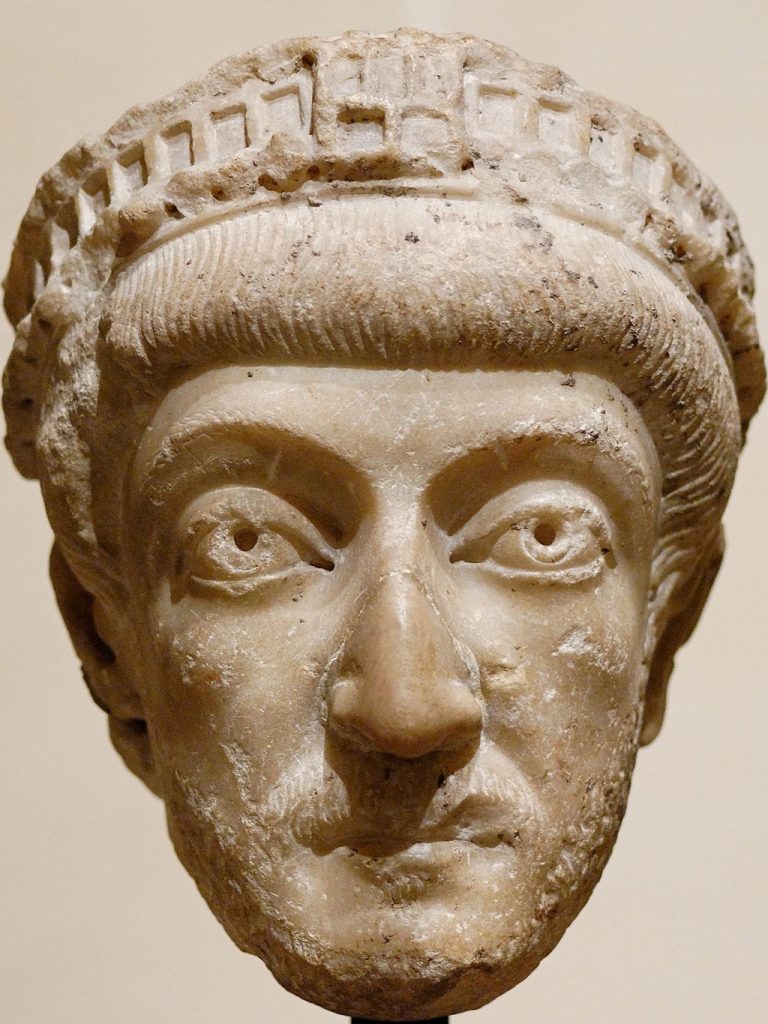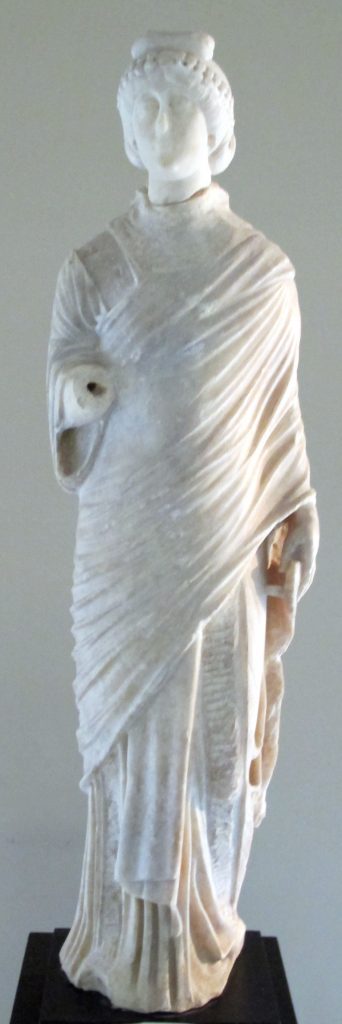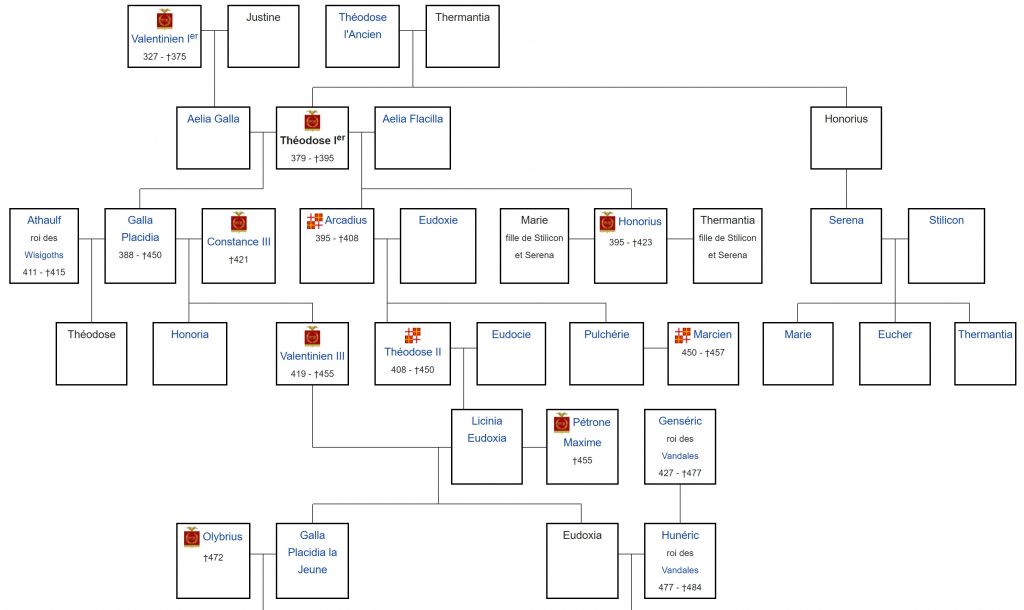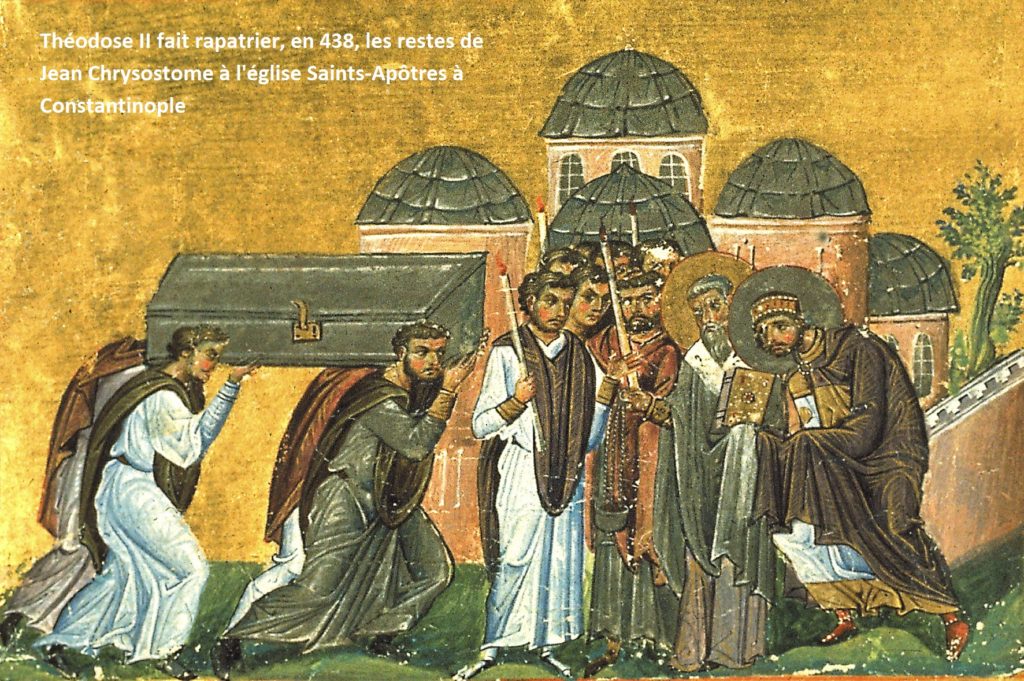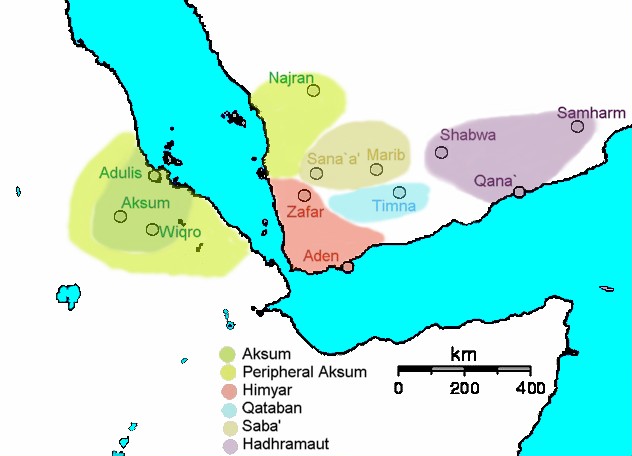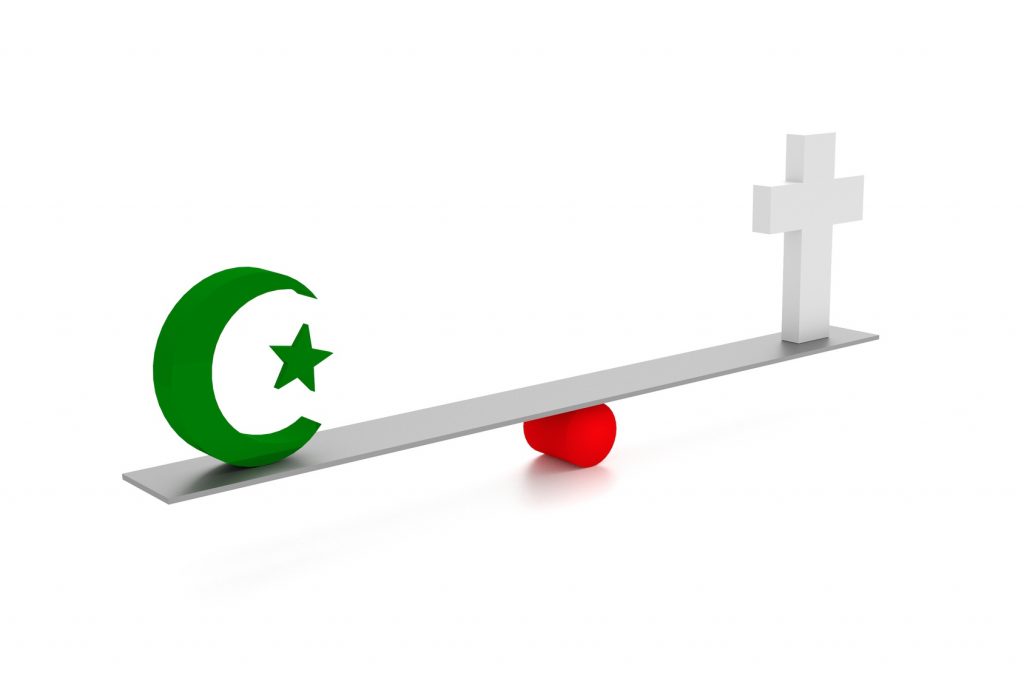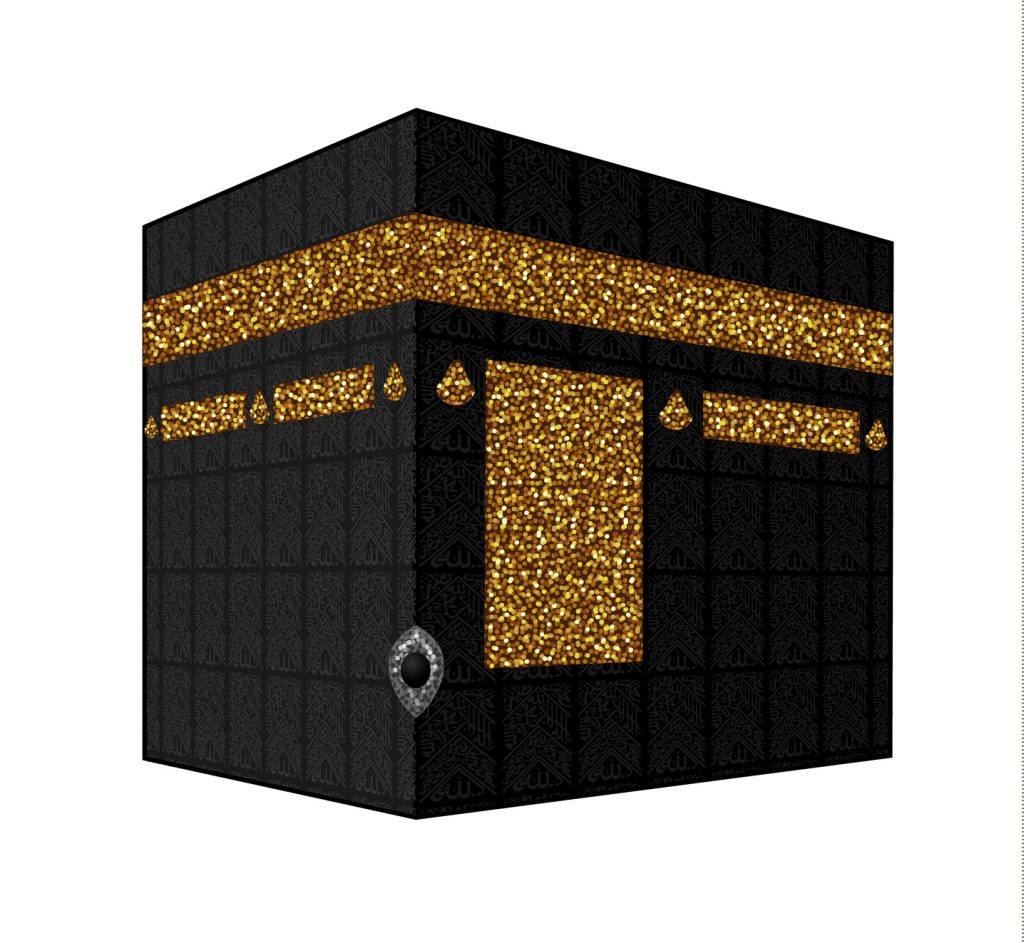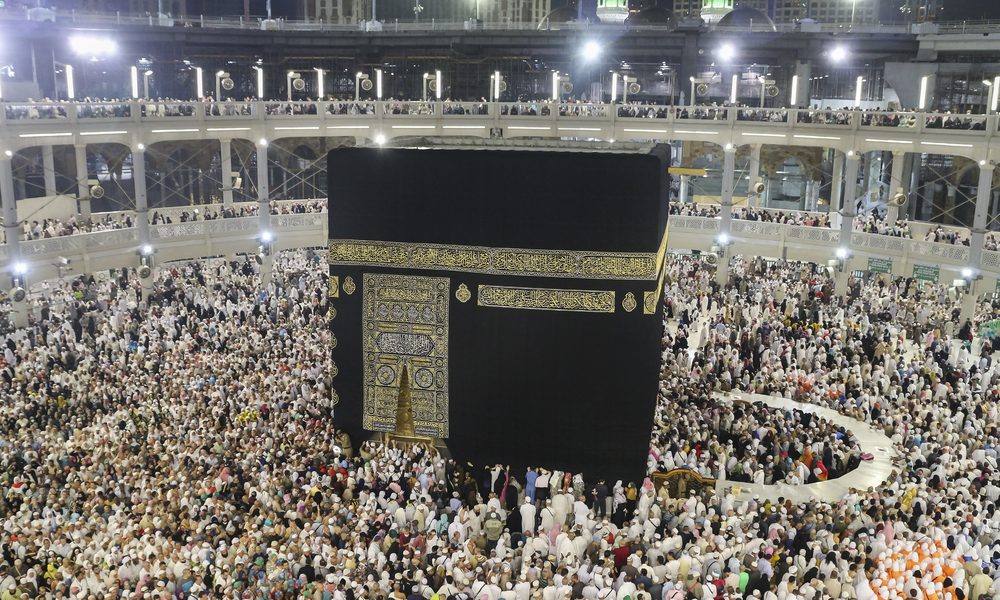
410 AD to 430 AD, Psalm 68: The Kaaba.
This site was first built in French (see www.147thgeneration.net). The English translation was mainly done using « google translation ». We have tried to correct the result of this translation to avoid interpretation errors. However, it is likely that there are unsatisfactory translations, do not hesitate to communicate them to us for correction.
(for that click on this paragraph)
Summary
This generation is from the years 410 AD to 430 AD.
According to our count, this generation is the 68th generation associated with Psalm 68. It is in this Psalm 68 that we therefore find an illustration of the facts of this generation.
At the level of the Roman empires, Theodosius II reigned over the Eastern Empire. Another son of Theodosius I the Great, Honorius has the reins of the Western Empire. Both are under the influence. The Western Empire is under « barbaric » attacks.To the Vandals, Alans and Suevi who invaded Gaul then Spain, is added the Visigoths under the command of King Alaric who will carry the sack of Rome. Alaric is ultimately defeated and Honorius returns to Rome.
The resistance of the political power to the religious power vis-à-vis the attitude toward Judaism, was still in the previous generation. It succeeds a cooperation against the Jews who sign the new status of Jews in Christian lands for many centuries.
The discourse changes, Judaism is no longer directly a threat: Christianity has become a state religion and any direct or indirect Jewish proselytism has become impossible. The new theologians are not satisfied with their apparent victory; they want to fossilize Judaism. Whoever initiates this turn is probably John Chrysostom. During his lifetime he opposed the power in Constantinople, of which he became the patriarch in 397, and, mainly to Empress Eudoxie, who had a rather free manners and kept certain limits with religion. John Chrysostom will be exiled and recalled several times by the Empress before dying in exile in 407. Before that, he rallies to his cause the pope.
Under Theodosius II, politics and religion meet. If still women control the reins of power, these, unlike Eudoxie, are fond of extreme religion. Thus Pulcheria, the elder sister of Theodosius and real mistress of power. The preaching of John Chrysostom can then find a real audience and thus win a posthumous victory over the power that fought him. Jean Chrysostome only initializes a new relationship of Christianity to Judaism, he is quickly relayed in particular by Augustine, the Bishop of Hippo, one of the major fathers of the Church.
This political and religious development is accompanied by deeds, as this generation sees the first official expulsion of Jews; that of the Jews of Alexandria.
To this generation imperial and pagan Rome which had expressed its contempt and arrogance towards the people of Israel falls. In turn after many other enemies before her. The people of Israel are ever present, already scattered among the nations, and ready to face the torments of the new power, the new mountain that is rising: the Christian West.
In fact, while the Christian empire is consolidating, the East is also preparing its awakening to monotheism that will soon give birth to Islam.
The awakening of the East to monotheism began with the creation of the Jewish kingdom of Himyar (or rather Judaizers).
In Tabari’s account we have the story of the conversion of this kingdom during the reign of its king As’ad (AD 400-440). According to this account, As’ad, then idolatrous, leads an expedition to destroy Medina. Two Jewish doctors then tell him that this is not possible because of the imminent coming of the prophet of Islam. Impressed by their revelations, As’ad decides to convert to Judaism. The king then heads for Mecca and still listening to the advice of the Jewish doctors refuses to destroy the city. The latter then explained to him the ritual to follow around the Ka’ba. As’ad gave the order to take away the idols that were in the temple (La Ka’ba) and to purify it, and he had it covered with cloth. Before him, the temple had never been covered with cloth; it was he who inaugurated this custom.
This legend is clearly mentioned in the psalm of this generation.
Talk
The sack of Rome
At the level of the Roman empires, this generation is entirely under the imprint of the reign of Theodosius II (401-450, emperor in 408) with regard to the Eastern Empire.
The beginning of this reign was delegated to Anthemius, prefect of the Praetorium, until his death in 414. From this date until 433, the power was actually exercised by Pulcheria, the elder sister of Theodosius. Other son of Theodosius the Great, Arcadius has the reigns of the Western Empire since 393, also under the influence of Stilicon, General « barbarian » of his army.
The latter died in 408. Honorius was then confronted with barbaric attacks. To the Vandals, Alans and Suevi who invaded Gaul then Spain, is added the Visigoths under the command of King Alaric who will carry the sack of Rome in 410.
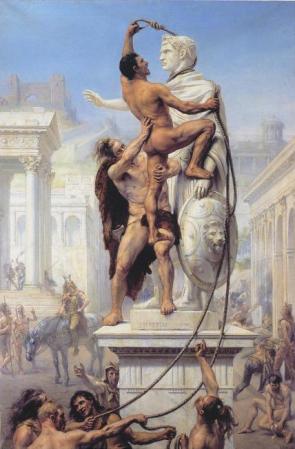
This generation begins with the symbolic fall of Rome. Alaric will finally be defeated and Honorius will return to Rome in 420 thanks to Constantius who will be named Co-Emperor and whose son Valentinian III will succeed Honorius.
John Chrysostom
The resistance of the political power to the religious power vis-à-vis the attitude toward Judaism, was still in the previous generation. It succeeds a cooperation against the Jews who sign the new status of Jews in Christian lands for many centuries.
In fact, this reversal of political power is accompanied by a radical change in the Christian theological discourse towards Judaism.
There has always been a certain amount of aggressiveness, which until now has been mostly competitive.
The discourse changes, Judaism is no longer directly a threat: Christianity has become a state religion and any direct or indirect Jewish proselytism has become impossible. The new theologians are not satisfied with their apparent victory; they want to fossilize Judaism. Whoever initiates this turn is probably John Chrysostom.
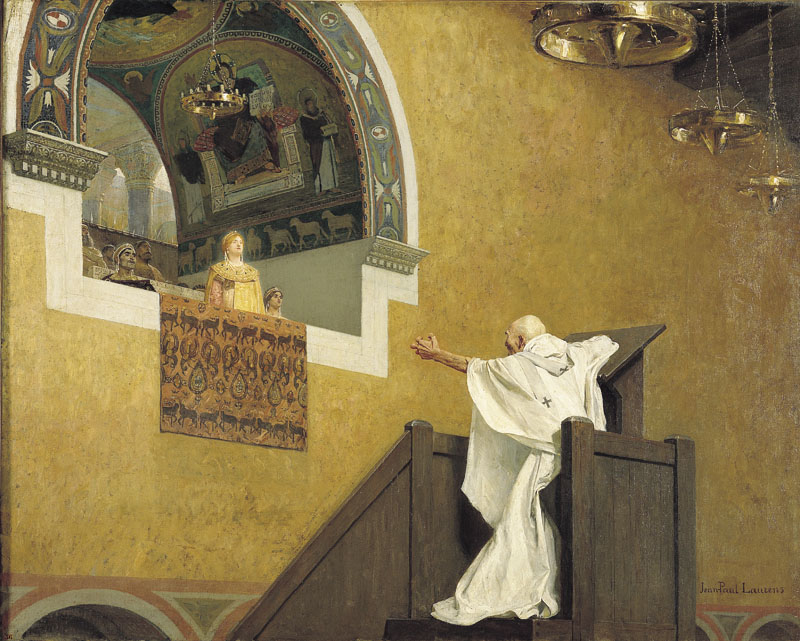
Although Jean Chrysostome is rather of the previous generation (344-407), it is especially after his death that his influence is the strongest.
In fact, during his lifetime he opposed the power in Constantinople, of which he became the patriarch in 397, and, mainly to Empress Eudoxie, who had a rather free manners and kept certain limits with religion. John Chrysostom will be exiled and recalled several times by the Empress before dying in exile in 407. Before that, he rallies to his cause the pope.
Pulcheria
Under Theodosius II, politics and religion meet. If still women control the reins of power, these, unlike Eudoxie, are fond of extreme religion. Thus Pulcheria, the elder sister of Theodosius and real mistress of power.
The preaching of John Chrysostom can then find a real audience and thus win a posthumous victory over the power that fought him. Jean Chrysostome only initializes a new relationship of Christianity to Judaism, he is quickly relayed in particular by Augustine (354-430), the Bishop of Hippo, one of the major fathers of the Church.
This political and religious evolution is accompanied by acts, since this generation takes place the first official expulsion of Jews:
- In 414 [1], the bishop of Alexandria Cyril, on the pretext of reprisals against a Jewish attack, organized a pogrom in miniature and had the Jews expelled from their old learned capital. It was the first expulsion of Jews out of the city, recorded in history.
Dominant Christianity
With this generation initiates a new order in the West.
Christianity, which until now was a mere competitor at the doctrinal level of Judaism, becomes the dominant religion. That is to say, it becomes the doctrine of power and that Judaism, failing to become an illicit religion, becomes an outdated religion, religion of vanquished.
This defines the new, very difficult relations of the Jews with the power in place in the Christian West (Christian empires of East and West, the new East is centered on the Persian empire still favorable for some time to the Jews), difficult centuries for Jews who will gradually be subject to pariah status.
With regard to this new phase of the night, David reaffirms, in the beginning of the psalm of this generation, his trust in God, those who rise up against the Jewish people stand up against God and end up suffering his anger:

- For the conductor, a psalm, a song of David.
- May God rise; His enemies scatter, and those who hate Him flee from before Him.
- As smoke is driven away, You will drive [them] away; as wax melts before fire, the wicked will perish from before God.
In the face of the new adversity, or rather strengthened, the Jews, despite what they undergo, renew their confidence in God. David, in the following verses of the psalm, recalls the covenant between God and his people that guarantees the final fate of the Jews:

- And the righteous will rejoice, yea, they will exult before God and they will delight with joy.
- « Sing to God, sing praises to His name, praise Him Who rides in Aravoth by His name Yah, and rejoice before Him.
- O Father of orphans and Judge of widows, O God in His holy dwelling place. »
- God settles the solitary in a house; He takes the prisoners out at the most opportune time, but the rebellious dwell in an arid land.
The mountains of the peoples
Despite the harshness of the exile that is reinforced by political changes, David recalls that in the past the Jews suffered even more exile in Egypt and that despite what the Egyptians could think about the decline of the Jews in relation to God he remembered his covenant in due time and released them.
As a result, the apparent apparent decay does not call into question God’s coming redemption of his people as the following verses of the psalm recalls:

- O God, when You went out before Your people, when You marched through the wilderness, forever.
- The earth quaked, even the heavens dripped; this is Sinai, because of God, the God of Israel.
- Generous rain You poured down, O God; Your heritage, which was weary, You established.
- Your congregation dwelt therein; You prepare with Your goodness for the poor, O God.
After the episode of the explorers, when the Israelites feared to conquer the promised land, God almost destroyed them. Finally he punishes them by making them wander in the desert until the generation of the desert is extinguished and a new generation can enter the promised land.
Realizing their mistake, the desert generation then tried to conquer this land alone. Without the support of God, the fight was lost in advance.
In the image of the mountain that the Israelites tried to climb alone on this occasion, the mountains of the peoples are too high to climb by the people of Israel when God is not at their side. So when the people of Israel tried to resist Babylon, it was nearly exterminated if the prophets of the day failed to convince some of the people to accept defeat and exile.
Later Babylon fell and the people of Israel found their way back to their land. Israel also tried to resist Rome, again it was a massacre, God was not at his side, at least at the military level.
Without the tenacity of some sages who founded Yavne in the turmoil, it was over the people of Israel.
In this generation we see imperial and pagan Rome, which had expressed its contempt and arrogance towards the people of Israel, falling in its turn.
The people of Israel are always present, already scattered among the nations, and ready to face the torments of the new power, of the new mountain that stands: the Christian West.
Whatever may be the apparent defeat of the people of Israel in the face of this new giant over the centuries, Israel knows that his God does not forget him. Like the Egypt of the Pharaohs, Babylon or pagan Rome, the West will eventually be defeated. Not by the armies of Israel, but by the divine will that will belittle its claims and recall the true and only greatness, that of God and Jerusalem its residence as stated in the predictions of Isaiah.
The mountain of Seir
The final fate of Israel within the nations and in particular in front of the new Rome (Edom / Seir), symbol of the Christian West, is confirmed by Ezekiel. Through the portrait of Séir, he gives a relatively faithful image of the new Western empire claiming to be « Verus Israel », thinking of the fate of the definitely acquired people of Israel:
- Then [2] the word of the Lord came to me, saying:
- « Son of man, direct your face toward Mount Seir and prophesy over it.
- And you shall say to it: So said the Lord God: Behold I am against you, O Mount Seir, and I shall stretch forth My hand upon you and make you desolate and waste.
- I shall lay your cities waste, and you will be desolate, and you will know that I am the Lord.
- Because you had everlasting hatred, and you hurled the children of Israel by the sword, on the day of their misfortune at the time of the end of their iniquity.
- Therefore, as I live, says the Lord God, for I shall make you into blood, and blood will pursue you; for surely you hated blood, and blood will pursue you.
- And I shall make Mount Seir into desolation and waste, and I shall cut off from you anyone passing through or returning.
- And I shall fill his mountains with his slain, your hills and your dales and all your streams-those slain by the sword will fall in them.
- I shall make you everlasting desolations, and your cities will not return, and you will know that I am the Lord.
- Because you said, « The two nations and the two lands will be mine, and we shall inherit it, » and the Lord was there,
- Therefore, as I live, says the Lord God, I shall commit [acts] like your wrath and like your [acts of] anger that you did out of your hatred for them, and I shall be known among them when I judge you.
- And you will know that I am the Lord. I heard all your blasphemies that you said concerning the mountains of Israel, saying, « They have become desolate; they were given to us to devour. »
- You have magnified yourselves against Me with your mouth, and you have multiplied your words against Me; I have heard.
- So said the Lord God: When the whole earth rejoices, I shall make you desolate.
- As you rejoiced over the inheritance of the house of Israel because it became desolate, so will I do to you; Mount Seir and all Edom will be desolate, even all of it, and they will know that I am the Lord.
- (end of chapter 15, beginning of chapter 16)
- Now you, son of man, prophesy concerning the mountains of Israel, and say; O mountains of Israel, hearken to the word of the Lord.
- So said the Lord God: Since the enemy said about you, « Aha! » and « the high places of the world have become our inheritance, »
- Therefore, prophesy and say; So said the Lord God: Because, yea because those around you were appalled and longed for you to be an inheritance for the remnant of the nations, and you were brought up on the lips of every language and the gossip of every people.
- Therefore, O mountains of Israel, hearken to the word of the Lord God. So said the Lord God to the mountains and to the hills, to the streams and to the valleys, to the desolate ruins and to the deserted cities, which became a scorn and a mockery to the remnant of the nations that are around.
- (….)
- And I shall no longer let you hear the disgrace of the nations; the taunt of the peoples you shall no longer bear, neither shall you bereave your nations any longer, » says the Lord God.
This conclusion will not fail to close the new era that is opening. What David recalls in the rest of the psalm. By first condemning the arrogance of nations towards the people of Israel who become more aggressive from this generation:

- The Lord will give out a word; they will announce it to a great multitude.
- Kings of hosts will wander, yea they will wander, and she who dwells in the house will divide the spoils.
- If you lie between the borders-the feathers of a dove covered with silver, and its pinions with brilliant gold.
- When the Almighty spreads out for kings therein, it will become as white as snow in darkness.
- The mountain of God is the mountain of Bashan; the mountain of peaks is the mountain of Bashan.
- Why do you lurk, you lofty mountains, for the mountain that God desired for His dwelling? …
- David castigates the pride of the nations who think they are ruling the people of Israel. This domination is illusory and will be ephemeral. The good right of the people of Israel will eventually be restored.
But this arrogance does not destabilize by the faith of David and his people towards his God. This is what he expresses in the following of the psalm where David interprets the test endured by his people as a proof of God’s trust:

- … Even the Lord will dwell [there] forever.
- God’s chariot is twice ten thousand times thousands of angels. The Lord was among them at Sinai in His holiness.
- You ascended on high, you took captives; you took gifts to be among men, and also rebellious ones for Yah God to dwell.
- Blessed is the Lord; every day God lavishes upon us our salvation forever.
- God is to us the God of salvations, but God the Lord has the ways to death.
God will spare His people from destruction. If the nations can believe in its decline during the long night that it crosses, the resurrection is at the rendezvous, as indicated by the rest of the psalm:

- Indeed God will wound His enemies’ head, the hairy pate of him who goes with his guilt.
- The Lord said, « I shall restore from Bashan; I shall restore from the depths of the sea.
- In order that your foot may wade through blood; the tongue of your dogs will have its portion from the enemies. »
- They saw Your ways, O God, the ways of my God, my King in sanctity.
- Singers went first, minstrels afterwards, in the midst of maidens playing timbrels.
- In congregations bless God the Lord, from the womb of Israel.
- There Benjamin the youngest rules over them; the princes of Judah pelt them with stones, as do the princes of Zebulun and the princes of Naftali.
- Your God has commanded your strength; show this strength, O God, which You have wrought for us.
The Kaaba
In fact, while the Christian empire is consolidating, the East is also preparing its awakening to monotheism that will soon give birth to Islam.
This duality Orient / Occident and Christianity / Islam will allow a certain balance of the world. On the other hand, it will allow nations to progress both towards civilization and monotheism, avoiding irreversible hegemony of one or the other.
The awakening of the East to monotheism began with the creation of the Jewish kingdom of Himyar (or rather Judaizers, it is likely that the religion practiced was quite freely adapted from the Judaism that we know, but claimed however the recognition of a Unique God). In Tabari, we have a story of the conversion of this kingdom during the reign of King As’ad (400-440):
- There [3] was in Yemen a Himyarite king, named As’ad […] He came out of Yemen, at the head of his large army and went to the Hijaz (Arabia region where are located Mecca and Medina). He was addicted to idolatry, as was all Arabia, the Hijaz, Mecca and Medina. Only in the neighborhood of Mecca and Medina, there were Jews, whose ancestors had come to settle in the Hejaz, during their flight from Nebuchadnezzar. They had founded some villages, such as Khaibar, Fadak, Qoraizha, Wâdî’l-Qora, Nazhir and Yambou, all of which were in the possession of the Jews, who followed the religion of Moses. […] Then (after suffering some failures in trying to destroy Medina, As’ad doubts about his enterprise) two men from among the Jewish doctors come to the Tobba (nickname of As’ad) and tell him: O king, you can not destroy this city. He asked: Why? They answered, « Because a prophet named Muhammad will come from the Quraish on the territory of Mecca, the Qoraysh will drive him out of the city, he will come to Medina, and there will be his house and his family. « . It is in his honor that God keeps the city; we thus found it in the Pentateuch. The king said: What is the Pentateuch? And they said, This is the book of God which Moses hath received from heaven. Then they exposed to the Tobba the religion of Moses. This religion pleased him, and he adopted Judaism, by ceasing to adore idols. He urged all his troops to embrace Judaism; what they did. Then he said to these two Jews: You must come with me to the land of Yemen, to convert the whole country to this religion. They agreed to accompany him, and he showered them with marks of benevolence and gifts. He said to them, Why do you not call the people of Medina to this religion? They answered: These men will believe by Muhammad.
We will avoid sharing reality and legend in this story. It nevertheless emerges that the Jews largely contributed to the emergence of monotheism in the East. They thus largely defended the expansion of Islam itself.
If it does not run smoothly with the Jews, it will be globally beneficial to them by acting as a counterbalance to the expansion of Christianity.
The awakening of nations to the knowledge of God whether in the Christian West or the Orient who is initiated to monotheism is mentioned in the following verses of the psalm:

- From Your Temple, which is over Jerusalem, kings will bring You tribute.
And David continues to evoke the ancient idolatrous peoples who turn to the worship of God (the bull is comparable to the priest, the calves is a « young » priest who symbolizes the recent conversion of his people, while the bars of silver evokes the old idolatrous offerings).

- Rebuke the beast among the reeds, the herd of bulls among the calves of the nations. Humbled, may the beast bring bars of silver. Scatter the nations who delight in war.
Tabari also tells us the origin of the Jews of Hedjaz:
- The king of Egypt [5] began the battle (against Nebuchadnezzar, who threatened him); he was defeated and killed. Nebuchadnezzar plundered all Egypt, killed the inhabitants or made them prisoners, and all those of the Israelites whom he met, he took them captive. But some of them fled from Syria and Egypt to the Hejaz, and since that time the Jews have remained in the land of Yathrib, where Medina is. There they built cities, such as Khaibar, Fadak, Qoraitah, and Wadi-l-Qora. They have stayed there to this day.
Based on this story and the previous story of the Ka’ba dress, which is to be placed on the present generation, we can approach the end of the psalm of this generation that echoes:

- Let Egyptian Koush [4] traders bring blue cloth …
- The origin of the traders (Egyptians) and the color of the cloth evoke the origin of the Jews of the Hejaz and their contribution to the dressing of the Kaaba whose main purpose is to withdraw the pagan worship associated with it (the idols are destroyed ).
- and Cush [4] come running to God, her hands outstretched.
- if we refer to Genesis [6] (« And the name of the second river is Gihon; that is the one that encompasses all the land of Cush.»), Cush refers to Southwestern Arabia, or approximately the Himyar empire at the time of interest. The verse then refers to the offerings of King Himyar to the Lord.
The conclusion of the psalm is in line with the record of this generation:
- Kingdoms of the earth, sing to God, sing praises to the Lord forever.
- This generation gives the ferment of the veneration of God both in the East and in the West.
- To Him Who rides on the heaven of heavens of old; behold, He gives forth with His voice a voice of strength.
- Attribute strength to God; over Israel is His pride, and His strength is in the skies.
- You are feared, O God, from Your Sanctuary; the God of Israel-He gives strength and power to the people; blessed be God.
- David can only praise God once again that in this generation shows the supremacy of his guidance over the nations.

[1] SW Baron: « History of Israel – II, The Early Centuries of the Christian Era » / Chapter: « The Beginning of the Medieval System » (French: « Histoire d’Israël – II, Les premiers siècles de l’ère chrétienne »/Chapitre : « Début u système médiéval » (p.846) )
[2] Yechezkel – Ezekiel – chapter 35 then chapter 36, verses 1 to 4 and verse 15.
[3] Tabari: « History of the Prophets and Kings: From Solomon to the Fall of the Sassanids » / Chapter: « The Tobba makes a pilgrimage to the Ka’ba and has it covered ». (French: Tabari/Histoire des prophètes et des rois : De Salomon à la chute des Sassanides/Chapitre : « Le Tobba fait un pèlerinage à la Ka’ba et la fait couvrir (p. 251-253) )
[4] This original translation is intended to be close to the original writings produced by Eugene H. Peterson in his version of the Bible « The Message » is in line with the French translation produced by A. Chouraqui which respects a similar translation approach.
[5] Tabari: « History of the Prophets and Kings: From Solomon to the Fall of the Sassanids » / Chapter: « History of Lohrasp (French: Tabari/Histoire des prophètes et des rois : De Salomon à la chute des Sassanides/Chapitre : « Histoire de Lohrasp (p. 58-59-) ).
[6] Bereishit – Genesis – Chapter 2, verse 13


